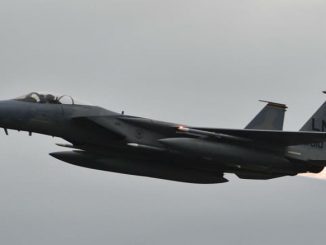
A US official report states that the Saudi-led coalition’s deadly attacks from 2015-2021 used jets and munitions largely supplied and maintained by the United States
According to the New York Times which saw the US internal government report, the US administration failed to evaluate civilian casualties and the use of American-made weapons in the killings caused by the Saudi-led coalition attacks in Yemen.
The report that has been issued by the Government Accountability Office focuses on the attacks carried out between 2015-2021 by the Saudi-led coalition, which has been at war with Yemen’s Houthi rebels since March 2015.
“The alliance has carried out deadly strikes using combat jets and munitions that have been supplied and maintained largely by American companies with the approval of the State Department and the Pentagon,” the report said.
According to the New York Times, the report has not been released publicly because the executive branch determined that it contains “classified information or controlled unclassified information”.
The newspaper said the report has been circulating in congressional offices because of budget legislation.
According to the Times, it is the second major report by a US agency that discusses the shortcomings of the government in preventing civilian causalities in the war in Yemen.
The first report was released by the State Department in 2020 and said the agency failed to take proper measures to reduce civilian deaths.
News of the report comes as President Joe Biden is scheduled to visit Saudi Arabia.
On Monday, several top US lawmakers urged Biden to rework Washington’s relationship with the kingdom and told him to warn Riyadh against pursuing more strategic cooperation with China on ballistic missiles amid reports of his trip.
“Saudi Arabia is one of the worst offenders of human rights violations in the world. They fuel modern-day slavery, repress women’s rights, torture and kill dissidents, suppress democratic organizing and are responsible for the ongoing humanitarian catastrophe in Yemen,” Congresswoman Ilhan Omar, a vocal critic of the kingdom, reportedly said.
“Putting human rights at the center of our foreign policy means being consistent about calling out human rights offenders. And Saudi Arabia should be at the top of that list.”
The report also comes a week after a bipartisan group of US lawmakers introduced a War Powers resolution that would bring an end to all remaining support for the Saudi-led coalition at war in Yemen, strengthening Biden’s pledge last year to end assistance to the coalition.
Yemen has endured years of chaos since Houthi rebels seized the capital Sanaa in 2014 and ousted then-President Abd-Rabbu Mansour Hadi from power.
The conflict metastasized into a regional power struggle in March 2015, when Saudi Arabia and its regional allies, including the United Arab Emirates, intervened to roll back the Iran-aligned Houthis.
Since then, the protracted conflict has seen an estimated 377,000 people killed, four million displaced, and a staggering 80 percent of the country forced to depend on aid for survival.
US lawmakers push
In this context, more than 40 members of Congress have introduced new War Powers resolution to end any US role in the Saudi-led coalition’s efforts in Yemen.
In early June, a bipartisan group of US lawmakers introduced a War Powers resolution that would bring an end to all remaining support for the Saudi-led coalition at war in Yemen, strengthening US President Joe Biden’s pledge last year to end assistance.
The new resolution would end US military participation in offensive air strikes by the Saudi-led coalition, including ending intelligence-sharing and logistical support such as maintenance and provision of spare parts.
It would also halt any US personnel from any direct or indirect role in the Saudi-led coalition’s forces without prior congressional authorization.
“Article I of the Constitution is clear: Congress, not the Executive branch, has the sole authority to declare war and authorize involvement of U.S. forces in overseas conflicts, including inserting U.S. troops as advisors in aid of foreign-led hostilities,” Congressman Peter DeFazio said in a statement.
“It’s critical that the Biden Administration take the steps necessary to fulfill their promise to end U.S. support for the disastrous Saudi-led war in Yemen.”
The resolution, spearheaded by DeFazio, Pramila Jayapal, Adam Schiff and Nancy Mace, includes an additional 44 co-sponsors and is also supported by 100 civil society, anti-war, and human rights organisations. DeFazio and Jayapal announced their intention to introduce the resolution earlier this year.
A companion bill will be introduced by Senator Bernie Sanders – a leading advocate against the Yemen war – in the Senate, according to the House Progressive Caucus.
“Congress cannot sit by and allow the United States’ complicity in the worst humanitarian crisis in the world to continue,” said Jayapal.
“There are more than 16 million Yemenis living on the brink of starvation and more than two million children suffering from acute malnutrition – and the American people’s tax dollars are helping finance that suffering.”
Saudi Arabia and its allies, notably the UAE, began their involvement in Yemen in 2015, when they launched a campaign to roll back gains made by the Houthi movement, who had taken over the capital of Yemen the previous year.
The coalition embarked on a massive air campaign, which rights groups have accused of killing scores of innocent civilians. Since 2015, the UN estimates that the war in Yemen has led to the death of more than 377,000 people, including from direct fighting as well as hunger and disease.
The United Nations has described Yemen as the world’s worst humanitarian catastrophe.
Weeks after entering office in 2021, Biden announced Washington would end support for offensive operations in the Saudi-led war in Yemen, marking a major foreign policy shift from the Trump administration.
The announcement was received warmly from progressives and peace advocates. However, questions soon emerged as to what “offensive support” constituted, and what would happen to key aspects of the coalition’s air strike operations such as aircraft maintenance, which the US provided.
The introduction of the legislation also follows months of tense relations between the US and Saudi Arabia over Riyadh’s refusal to increase oil output amid rising energy prices in the aftermath of Russia’s invasion of Ukraine.
Biden is reportedly planning to travel to the kingdom this month, where officials have said both oil output and the potential to normalize relations with Israel are on the table.
It is unclear whether US support for the Yemen war is on the list of issues to be discussed, but the timing of the new war power resolution provides a clear signal to Biden of where many in Congress stand on the conflict.
“It is total hypocrisy for the Biden administration to be opposing Putin’s horrifying war in Ukraine while supporting Saudi Arabia’s war in Yemen,” Sunjeev Bery, executive director of Freedom Forward reportedly said.
“Instead of working with climate-destroying oil dictators like the Saudi monarchy, the Biden administration should stand on the side of peace.”
Congress attempted to pass multiple iterations of the Yemen War Powers resolution during the Trump administration, but none of the measures had been able to overcome the former US president’s veto power.
However, Hassan El-Tayyab, legislative director for Middle East policy at Friends Committee on National Legislation, reportedly stated that the nationwide ceasefire announced earlier this year by Yemen’s warring parties “offers hope that an end to the seven-year conflict might finally be possible”.
“Congress must help prevent backsliding by Saudi Arabia, which has driven so much of the violence through indiscriminate airstrikes and crippling blockade, by passing the Yemen War Powers Resolution and blocking U.S. military support for any renewed hostilities,” he said.
Yemen entered into a United Nations-brokered truce on 2 April, marking the first day of the Muslim holy month of Ramadan.
It was the first time the country had seen a nationwide truce in years. It would also allow fuel imports into Houthi-held areas and some flights to operate from Sanaa airport, which had been closed to commercial traffic since August 2016 because of coalition air strikes. A month later, the first commercial flight took off from Sanaa.
The ceasefire agreement, however, ends this month and without a renewal or other measure to halt fighting, Yemen could again be engulfed in major violence.
“Congressional pressure is critical right now,” said El-Tayyab, “to keep the warring parties at the bargaining table and off the battlefield.”



